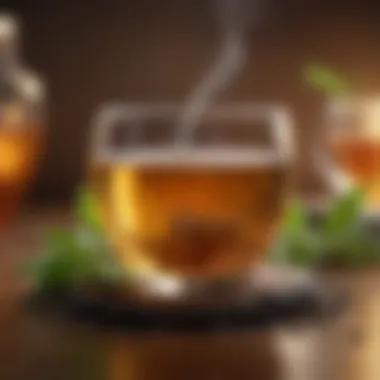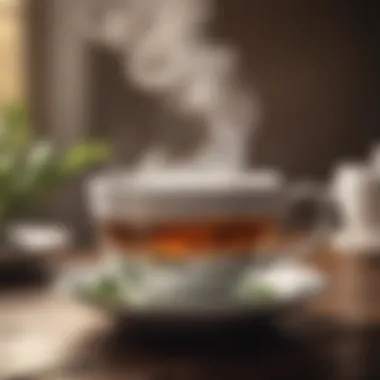Unlocking the Calming Power: The Therapeutic Effects of Tea for Managing Stress and Anxiety


Research Overview
Health Implications
The discussion on the impact of tea on health in terms of stress and anxiety management extends into exploring the potential benefits and risks associated with its consumption. Through various examples and research findings, it becomes evident how integrating tea into one's daily routine can have a positive influence on emotional well-being. By uncovering the soothing power of different tea blends, individuals can discover a natural remedy that promotes relaxation and aids in stress reduction without resorting to pharmaceutical interventions.
Well-being Strategies
In dissecting the practical implications of utilizing tea for stress and anxiety relief, it is crucial to provide readers with actionable tips and strategies based on research. These strategies offer guidance on how to implement positive changes in daily routines to optimize well-being through the consumption of tea. By weaving together personal anecdotes and case studies that highlight the benefits of incorporating tea, individuals gain a deeper understanding of how such simple adjustments can significantly impact their overall mental health.
Expert Insights
Understanding Stress and Anxiety
When delving into the intricacies of stress and anxiety, it is crucial to grasp their significance in the realm of emotional well-being. Understanding the profound impact that stress can have on mental health is essential for individuals seeking effective coping mechanisms. This article aims to shed light on the intricate relationship between stress and anxiety, offering insights into how tea can act as a natural remedy to alleviate these common afflictions.
The Impact of Stress on Mental Health
Definition of Stress
Stress, in its essence, embodies the body's physiological response to external pressures or demands. The defining characteristic of stress lies in its ability to trigger a cascade of reactions within the body, leading to heightened alertness and potential distress. In the context of this article, exploring the definition of stress provides a foundational understanding of how external factors can influence internal emotional states.
Effects of Chronic Stress
Chronic stress, characterized by prolonged exposure to stressful situations, can have detrimental effects on mental well-being. The persistent activation of the body's stress response systems can lead to a myriad of health issues, both physical and psychological. Understanding the implications of chronic stress is vital for fostering resilience and implementing healthy coping strategies in daily life.
Link Between Stress and Anxiety
The intricate link between stress and anxiety is a pivotal aspect of mental health discourse. Chronic stress can pave the way for the development of anxiety disorders, amplifying feelings of worry, unease, and apprehension. By exploring the interconnected nature of stress and anxiety, individuals can gain a holistic perspective on the impact of external stressors on internal emotional states.
Anxiety Disorders and Their Symptoms
Types of Anxiety Disorders
Anxiety disorders encompass a diverse array of mental health conditions characterized by persistent feelings of anxiety and fear. Understanding the distinct subtypes of anxiety disorders, such as generalized anxiety disorder and panic disorder, is crucial for recognizing and addressing these prevalent mental health concerns.
Common Symptoms of Anxiety
The symptoms of anxiety manifest in various forms, ranging from physiological reactions like racing heartbeats to cognitive disturbances such as excessive worrying and restlessness. By elucidating the common symptoms of anxiety, individuals can identify potential red flags in their own mental well-being and seek appropriate support and intervention.
Consequences of Untreated Anxiety
The repercussions of leaving anxiety untreated can be profound, leading to a plethora of adverse outcomes on one's overall quality of life. From social isolation to impaired cognitive function, the consequences of untreated anxiety underscore the importance of proactive management and treatment approaches.


This detailed exploration strives to offer actionable insights into the intricate dynamics of stress and anxiety, emphasizing the role of tea as a holistic tool in promoting emotional resilience and well-being.
Tea as a Natural Remedy
Tea's significance as a natural remedy is pivotal in the discourse on stress and anxiety relief. As an ancient tradition rooted in various cultures, tea has been revered for its calming properties and potential health benefits. The infusion of herbs, leaves, and other natural elements in hot water culminates in a soothing beverage that goes beyond mere refreshment. In this article, we delve into the specific elements, benefits, and considerations surrounding tea as a natural remedy for managing stress and anxiety.
Herbal Teas for Stress Relief
Chamomile Tea
Chamomile tea stands out for its gentle yet effective stress-relieving properties. Known for its mild sedative effects, chamomile tea is a popular choice for promoting relaxation. The key characteristic of chamomile tea lies in its ability to soothe the mind and body, making it a beneficial inclusion in stress management routines. Despite its advantages in calming the nerves, chamomile tea may not be as potent for severe anxiety cases.
Lavender Tea
Lavender tea, infused with the aromatic essence of lavender flowers, offers a unique approach to stress relief. Renowned for its calming aroma and potential anxiety-reducing effects, lavender tea provides a soothing experience for individuals seeking emotional well-being. The distinctive feature of lavender tea is its fragrant nature that can evoke a sense of tranquility. However, some may find the taste of lavender tea overpowering and not suitable for their palate.
Peppermint Tea
Peppermint tea, with its invigorating minty flavor, serves as a refreshing option for stress relief. The key characteristic of peppermint tea lies in its ability to awaken the senses and promote mental clarity. This makes peppermint tea a popular choice for individuals looking to alleviate stress while staying alert. Despite its refreshing attributes, peppermint tea may not be suitable for those sensitive to strong flavors or with certain digestive issues.
Green Tea for Anxiety Management
L-Theanine in Green Tea
Green tea contains L-Theanine, an amino acid known for its calming effects on the mind. The key characteristic of L-Theanine in green tea is its ability to induce relaxation without drowsiness, making it an ideal choice for anxiety management. By promoting a sense of tranquility, L-Theanine contributes to reducing stress levels and enhancing cognitive function. However, excessive consumption of green tea may lead to adverse effects due to its caffeine content.
Stress-Reducing Properties
Apart from L-Theanine, green tea possesses stress-reducing properties attributed to its antioxidant compounds. The key characteristic of these properties is their role in combating oxidative stress in the body, which can impact mental well-being. By reducing oxidative damage, green tea helps in alleviating anxiety symptoms and promoting overall health. Despite its benefits, individuals sensitive to caffeine should monitor their green tea intake.
Other Health Benefits of Green Tea
Green tea offers a myriad of health benefits beyond stress management. From boosting metabolism to enhancing heart health, green tea serves as a versatile addition to one's wellness routine. The unique feature of these benefits is their holistic impact on physical and mental well-being. However, individuals sensitive to caffeine or with certain health conditions should consult a healthcare provider before incorporating green tea into their daily regimen.
Black Tea for Relaxation
The Role of Theaflavins
Black tea contains theaflavins, polyphenolic compounds that contribute to its soothing properties. The key characteristic of theaflavins in black tea is their ability to promote relaxation and stress relief. By interacting with neurotransmitters in the brain, theaflavins play a role in inducing a sense of calmness. Despite its relaxation benefits, black tea's theaflavins may interact with certain medications or have varying effects based on individual tolerance levels.
Antioxidant Content
Black tea boasts a high antioxidant content, notably catechins and theaflavins, which play a crucial role in combating oxidative stress. The key characteristic of black tea's antioxidant profile is its ability to scavenge free radicals and reduce cellular damage. By fostering a healthier internal environment, black tea supports not only relaxation but overall well-being. Nonetheless, individuals sensitive to caffeine should moderate their black tea intake.
Caffeine Levels in Black Tea


While black tea offers relaxation benefits, it also contains caffeine that can impact stress and anxiety levels. The key characteristic of caffeine in black tea is its potential to stimulate the nervous system, leading to increased alertness. Moderate consumption of black tea can provide a gentle energy boost without causing jitters. However, individuals sensitive to caffeine should be mindful of their intake to avoid potential side effects.
Choosing the Right Tea
In the realm of stress and anxiety relief, understanding the significance of choosing the right tea cannot be understated. The type of tea you select can greatly impact its effectiveness in promoting relaxation and emotional well-being. By considering various factors such as flavor preferences, caffeine sensitivity, and nutritional content, you can tailor your tea choice to best address your individual needs and preferences. Selecting the right tea is a pivotal step in harnessing the therapeutic benefits of tea for alleviating stress and anxiety.
Factors to Consider
Flavor Preferences
Delving into the realm of flavor preferences opens up a world of sensory experiences that can enhance the calming effects of tea. The taste and aroma of tea play a crucial role in creating a soothing and enjoyable drinking experience. Whether you prefer the soothing notes of chamomile, the invigorating freshness of peppermint, or the delicate floral hints of lavender, selecting a tea that aligns with your taste preferences can elevate your tea-drinking ritual. Exploring different flavor profiles can add a layer of enjoyment to the process of stress relief through tea consumption.
Caffeine Sensitivity
Understanding your caffeine sensitivity is paramount when choosing a tea for stress and anxiety relief. While some individuals may benefit from the stimulating effects of caffeine in moderation, others may find that it exacerbates their anxiety symptoms. Opting for caffeine-free or low-caffeine teas can help manage stress levels without causing heightened agitation or restlessness. By being mindful of your caffeine tolerance, you can select teas that promote relaxation and mental clarity without the jittery side effects associated with high caffeine intake.
Nutritional Content
Examining the nutritional content of tea can provide valuable insights into its potential health benefits. Certain teas are rich in antioxidants, vitamins, and minerals that contribute to overall well-being and may offer additional support in combating stress and anxiety. Whether you prioritize teas with immune-boosting properties, anti-inflammatory compounds, or calming botanicals, considering the nutritional content can enhance the therapeutic value of your tea selection. Choosing teas with specific nutrients that align with your wellness goals can be a proactive approach to managing stress through dietary choices.
Quality and Source
Organic vs. Conventional
Differentiating between organic and conventional teas underscores the importance of sourcing practices in determining tea quality. Opting for organic teas ensures that your tea is free from synthetic pesticides and harmful chemicals, promoting a cleaner and more environmentally conscious option. Conventional teas, while more widely available, may contain residues of agricultural chemicals that could potentially detract from the tea's purity. By choosing organic teas, you prioritize your health and support sustainable farming practices that benefit both you and the planet.
Fair Trade Practices
Considering fair trade practices when selecting tea highlights the ethical dimension of your purchase decisions. Supporting fair trade ensures that tea producers receive fair compensation for their labor and helps foster equitable trading relationships within the industry. By choosing teas that adhere to fair trade standards, you contribute to social responsibility initiatives that empower communities and promote global economic fairness. Making a conscious choice to purchase fair trade teas aligns with values of fairness and equity, enriching your tea-drinking experience with ethical considerations.
Herbal vs. Blended Teas
Exploring the distinction between herbal and blended teas opens up a world of flavor combinations and aromatic profiles. Herbal teas, derived from botanical ingredients such as flowers, roots, and leaves, offer natural remedies with unique health benefits and soothing properties. On the other hand, blended teas combine different tea varieties and ingredients to create complex flavors and nuanced experiences. Choosing between herbal and blended teas depends on your flavor preferences and wellness objectives, with each option presenting a diverse range of flavors and potential health advantages. Whether you opt for the simplicity of single-ingredient herbal teas or the complexity of blended tea creations, selecting the tea type that resonates with you can enhance your stress and anxiety relief journey.
Incorporating Tea into Your Routine
Tea can be a potent tool in your daily routine to combat stress and anxiety. By incorporating various teas into different parts of your day, you can harness their beneficial properties to promote emotional well-being and relaxation effectively. Whether you choose to kickstart your morning with a revitalizing blend or unwind in the evening with a soothing cup, the rituals surrounding tea consumption can add a sense of calm and mindfulness to your life. Selecting the right tea blends and brewing methods tailored to your needs can make a significant impact on managing stress and anxiety.
Morning Rituals
Tea Blends for Energy
When it comes to energizing blends, choosing teas rich in antioxidants and moderate caffeine content can provide a healthy boost to start your day. Incorporating ingredients like green tea, ginseng, or matcha can offer sustained energy without the jitters often associated with coffee consumption. These blends not only provide a mindful way to kick off your morning but also support mental clarity and focus throughout the day.
Mindful Brewing Practices


The ritual of brewing tea mindfully allows you to slow down, focus on the present moment, and appreciate the sensory experience of preparing your beverage. Mindful brewing involves paying attention to each step of the process, from selecting your tea leaves to steeping them at the right temperature and savoring the aroma and flavor. This practice encourages a sense of mindfulness and relaxation, setting a positive tone for the day ahead.
Benefits of Hydration
Staying hydrated is essential for overall health and well-being, and incorporating hydration through tea consumption adds a flavorful twist to this necessity. Herbal teas, infused with refreshing ingredients like mint or lemongrass, not only hydrate the body but also provide various health benefits. Hydration promotes mental alertness, regulates body temperature, and supports various bodily functions, contributing to a holistic approach to stress management.
Evening Relaxation
Bedtime Tea Rituals
Creating a bedtime tea ritual signals to your body that it's time to unwind and prepare for restful sleep. Herbal blends like chamomile, valerian root, or lavender have natural calming properties that promote relaxation and help alleviate anxiety symptoms. Enjoying a warm cup of these teas before bed can establish a soothing nighttime routine that cues your body and mind for a peaceful slumber.
Creating a Calming Environment
Setting the stage for relaxation involves creating a calming environment conducive to unwinding. Dimming lights, playing soft music, or practicing gentle stretches can enhance the calming effects of bedtime tea rituals. Establishing a peaceful ambiance in your bedroom can signal to your brain that it's time to relax, promoting a restful night's sleep and reducing stress levels.
Unwinding Techniques
Incorporating unwinding techniques such as deep breathing exercises or mindfulness meditation before bed can synergize with bedtime tea rituals to enhance their effectiveness. Techniques like progressive muscle relaxation or guided visualization can further relax the body and mind, preparing you for a night of deep, rejuvenating sleep. Unwinding practices complement the benefits of bedtime tea, creating a holistic approach to relieving stress and anxiety at the end of the day.
Additional Strategies for Stress Management
Mindfulness Practices
Deep Breathing Exercises
Deep breathing exercises are a fundamental component of mindfulness practices that play a pivotal role in stress reduction. The technique involves conscious regulation of breath to promote relaxation, reduce anxiety, and improve mental clarity. In the context of this article, deep breathing exercises serve as a valuable tool in amplifying the benefits of tea for stress relief. The rhythmic inhalation and exhalation patterns of deep breathing create a calming effect on the nervous system, aiding in stress reduction and emotional equilibrium. Incorporating deep breathing exercises into daily routines can significantly enhance one's ability to manage stressful situations and enhance overall well-being.
Meditation Techniques
Meditation stands as a cornerstone practice in stress management, offering a profound impact on mental health and emotional resilience. The practice involves cultivating mindfulness, focus, and awareness through various techniques such as guided meditation, mindfulness meditation, and loving-kindness meditation. Within the scope of this article, meditation techniques synergize with the benefits of tea in alleviating stress and anxiety. By fostering a sense of inner peace and mental clarity, meditation complements the soothing effects of tea, creating a harmonious approach to emotional well-being.
Yoga for Stress Relief
Yoga serves as a dynamic practice combining physical postures, breathwork, and meditation to cultivate a state of mind-body harmony. When integrated with tea consumption for stress relief, yoga offers a holistic approach to addressing both physical and emotional tension. The fluid movements and conscious breathing techniques in yoga enhance relaxation, reduce cortisol levels, and promote a sense of tranquility. Embracing yoga as a complementary practice to tea consumption can yield synergistic benefits, fostering resilience, and emotional balance.
Professional Support
Clinical intervention and guidance from mental health professionals play a vital role in navigating stress and anxiety effectively. In the context of this article, delving into various professional support options such as therapy, consulting mental health professionals, and engaging in support groups and communities sheds light on comprehensive approaches to addressing mental health challenges. These support systems provide individuals with tailored strategies, coping mechanisms, and emotional support, enhancing the overall efficacy of stress management practices complimenting the use of tea for relaxation and emotional well-being.
Therapy Options
Therapy offers a structured and supportive environment for individuals to explore and address their mental health concerns. By engaging in therapy sessions, individuals can gain valuable insights, develop coping strategies, and cultivate resilience in the face of stress and anxiety. Within the context of this article, therapy options serve as a proactive approach to enhancing the impact of tea consumption on stress management, fostering emotional well-being, and adaptive coping mechanisms.
Consulting a Mental Health Professional
Consulting a mental health professional provides individuals with expert guidance, assessment, and personalized interventions to address their specific mental health needs. In the realm of this article, seeking guidance from mental health professionals enhances the efficacy of tea consumption in alleviating stress and anxiety symptoms. The professional insight and support garnered through consultations contribute to a comprehensive approach to mental well-being, integrating the benefits of tea with specialized mental health care.
Support Groups and Communities
Engaging in support groups and communities fosters a sense of belonging, understanding, and mutual support among individuals facing similar mental health challenges. By participating in support networks, individuals can share experiences, resources, and coping strategies, bolstering their resilience and emotional well-being. In the context of this article, embracing support groups and communities as part of stress management complements the use of tea by providing a holistic support system and sense of community, strengthening one's capacity to manage stress and anxiety effectively.



